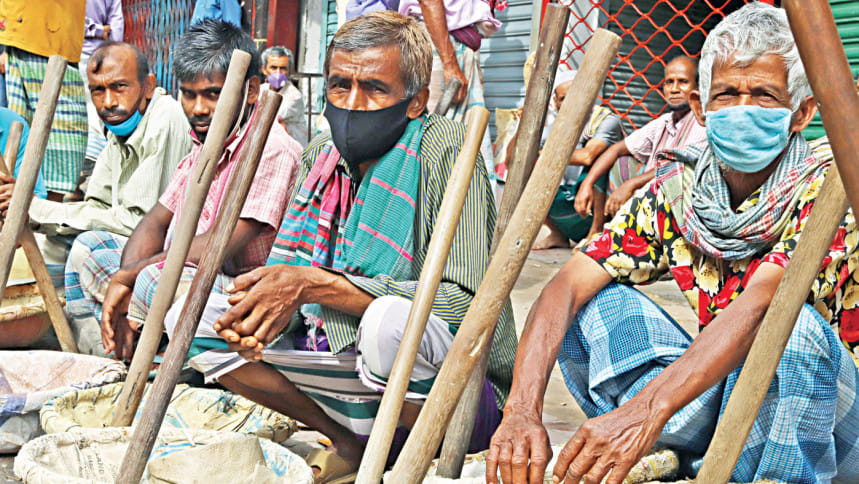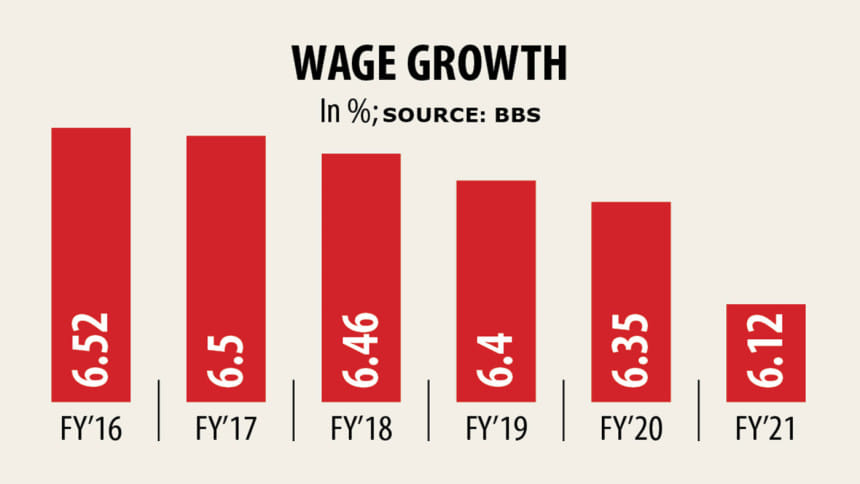Wage workers in double whammy

Wage labourers in Bangladesh passed a gruelling year as their income growth dropped to a six-year low in the last fiscal year, whereas living expenses went up amid rising inflation, official figures showed.
General wage expanded by 6.12 per cent in the fiscal year of 2020-21, which is the slowest pace of growth since 2015-16, according to the Wage Rate Index (WRI) of the Bangladesh Bureau of Statistics (BBS).
The rate fell by 44 basis points to 5.97 per cent in June compared to May's 6.41 per cent.
The wage rate index is intended to measure the movement of nominal wages of low-paid skilled and unskilled labour over time in different sectors of the economy. It is also used to measure changes in real wages.
In FY21, the wage growth expanded by 6.39 per cent in the agricultural sector, 5.51 per cent in the industrial sector, and 6.07 per cent in the service sector, all of which grew at the slowest pace in six years.

The sluggish wage growth came in a year when inflation overshot the government's target. The average inflation in FY21 was 5.56 per cent, exceeding the goal of 5.4 per cent.
Inflation spurted to 5.64 per cent in June, the highest in eight months, BBS data showed. This reflected the disruptions faced by the supply chain and the rise in the cost of living.
The deceleration in wage growth and the rise in inflation means workers' purchasing power has squeezed in the most challenging period of their lives.
Rizwanul Islam, a former special adviser for the employment sector at the International Labour Office in Geneva, said real wages declined in 2020-21 in important sectors like manufacturing and construction.
This is happening at a time when employment opportunities also declined. That implies that the incomes of a large number of low-income people have gone down, he said.
"Thus, the conclusion -- based on BBS data -- is inescapable that many are joining the ranks of the poor."
The rate of the increase in real wages has been on a downward trend for a few years, according to Khondaker Golam Moazzem, research director of the Centre for Policy Dialogue.
He said inflation-adjusted real wages fell in all sectors except agriculture in June. The fisheries and construction sectors saw the most declines.
The wage rate in the agriculture sector grew by 6.13 per cent in June, down from 6.71 per cent a month ago. The fisheries sector's wage growth fell 53 basis points to 4.92 per cent and the construction sector's by 22 basis points to 4.31 per cent.
The broader industrial sector's wage growth was down 20 basis points to 5.59 per cent in June, and the service sector's wage growth dropped 24 basis points to 6.06 per cent.
The decline in the real wages for a major portion of the working class has negative consequences, Moazzem said.
"Their savings capacity is squeezing. Jobs are relatively unavailable. There might not be any job sector growth. As a result, there will be more informality in the sector."
"As a result, food intake and nutrition will take a hit. Child labour in families may go up. Indebtedness will deepen."
Division-wise, the wage rate growth rose 12 basis points to 5.93 per cent in Dhaka in FY21 compared to a year ago and by 25 basis points to 7.05 per cent in Rajshahi.
It fell to 5.99 per cent in Chattogram, 7.27 per cent in Rangpur, 6.11 per cent in Khulna, 6.16 per cent in Barishal, and 6.01 per cent in Sylhet.
"The wage rate decline is the reflection of the real scenario," said Sayema Haque Bidisha, a professor of the economics department at the University of Dhaka.
She said the wage data represented the workers who were employed and about whom information was available.
Beyond this group of people, many people are unemployed or have lost jobs. There is another group of people who belong to the completely informal sector.
Food inflation has grown in the last several months. At the end of the fiscal year, the average food inflation rose to a three-year high of 5.73 per cent.
Prof Bidisha said the people in the urban areas had lost jobs and saw income cut. So, internal migrants were facing pressure, and even many of them returned to villages.
"Because of the declining purchasing power, food poverty among the poorest of the poor might have increased."
Bidisha, also the research director of the South Asian Network on Economic Modeling, called for expanding the operation of the open market sales of essentials to give some respite to the lower-income groups.
"Market monitoring has to be strengthened by deploying more people to keep the price stable of basic commodities and prevent their unusual price hike."
She urged the government to link the interest of the workers with the budgetary stimulus and incentive packages for industries and businesses to avoid job and wage cuts.
"The government may introduce an unemployment allowance even for a temporary period."
According to Moazzem, the main initiatives to support the workers would have to come from the government as the private sector was not in a position to invest in generating jobs.
"Government-led initiatives such as public works and social safety net schemes have to be expanded."
He called for implementing infrastructure projects in both rural and urban areas that created jobs.
Non-governmental organisations directly work with the poor people, so the government's financing for the NGO-led initiatives should be increased, he said.
"Bangladesh is now at a stage where it has to prioritise the coronavirus vaccination programme to revive economic activities."


 For all latest news, follow The Daily Star's Google News channel.
For all latest news, follow The Daily Star's Google News channel. 



Comments